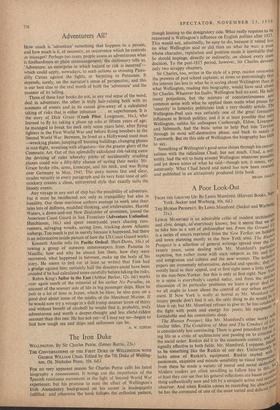The Iron Duke
'WELLINGTON. By Sir Charles Petrie. (lathes Barrie, 25s.)
THE CONVERSATIONS OF THE FIRST DUKE OF WELLINGTON WITH GEORGE WILLIAM CHAD. Edited by the 7th Duke of Welling- ton. (St. Nicholas Press, 10s. 6d.) FOR no very apparent reason Sir Charles Petrie calls his latest biography a reassessment. It brings out the importance of the Spanish resistance movement in the light of Second World War experience; but his promise to note the effect of Wellington's Irish Ascendancy background on his career is inadequately fulfilled: and otherwise the book follows the orthodox pattern,
though leaning to the denigratory side. What really requires to be reassessed is Wellington's influence on English politics after 1815- This would not, admittedly, be easy to do, because it rested less on what Wellington said or did than on what he was: a man whose character, reputation and position made it inevitable that he should impinge, directly or indirectly, on almost every state decision. To the post-1815 period, however, Sir Charles devotes only two scrappy chapters.
Sir Charles, too, writes in the style of a prep. master reviewing the prowess of past school captains; at times so patronisingly that the interest lies less in what he is saying about Wellington than in what Wellington, reading this biography, would have said about Sir Charles. Whatever his faults, Wellington had no cant. He held many prejudices, but the mixture of conscientiousness and common sense with what he applied them made what passes for 'sincerity' in latterday politicians look a very shoddy article. Tile Wellington-Peel axis was certainly one of the great formative influences in British politics; and it is at least possible that only Wellington, unlike his colleagues Castlereagh, Eldon, Liverpool and Sidmouth, had the basic sense to help Peel tide Tory/s111 through its most self-destructive phase, and back to sanity at Tamworth. But on this side of Wellington the biography has little to say. Something of Wellington's good sense shines through his conver- sations with the ridiculous Chad; bilt not much. Chad, a non- entity, had the wit to hang around Wellington whenever possible, and jot down notes of what he said—though not, it seems, ver,l' accurately. What Chad heard and noted has now been rescued' and published in an attractively produced little book.
BRIAN INGLIS










































































 Previous page
Previous page